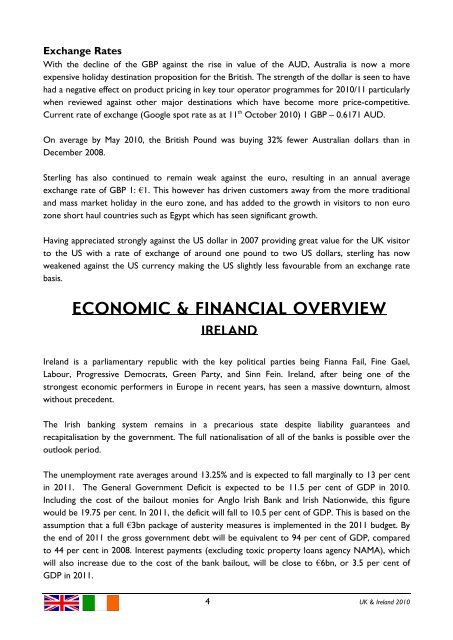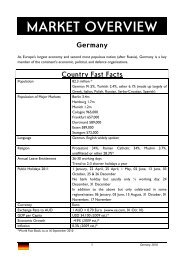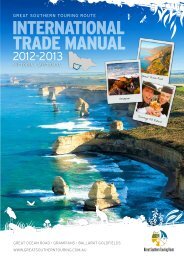MARKET OVERVIEW
01213+0%*%4+2520+56/87+/9% 2+ - Great Southern Touring ...
01213+0%*%4+2520+56/87+/9% 2+ - Great Southern Touring ...
- No tags were found...
Create successful ePaper yourself
Turn your PDF publications into a flip-book with our unique Google optimized e-Paper software.
Exchange Rates<br />
With the decline of the GBP against the rise in value of the AUD, Australia is now a more<br />
expensive holiday destination proposition for the British. The strength of the dollar is seen to have<br />
had a negative effect on product pricing in key tour operator programmes for 2010/11 particularly<br />
when reviewed against other major destinations which have become more price-competitive.<br />
Current rate of exchange (Google spot rate as at 11 th October 2010) 1 GBP – 0.6171 AUD.<br />
On average by May 2010, the British Pound was buying 32% fewer Australian dollars than in<br />
December 2008.<br />
Sterling has also continued to remain weak against the euro, resulting in an annual average<br />
exchange rate of GBP 1: €1. This however has driven customers away from the more traditional<br />
and mass market holiday in the euro zone, and has added to the growth in visitors to non euro<br />
zone short haul countries such as Egypt which has seen significant growth.<br />
Having appreciated strongly against the US dollar in 2007 providing great value for the UK visitor<br />
to the US with a rate of exchange of around one pound to two US dollars, sterling has now<br />
weakened against the US currency making the US slightly less favourable from an exchange rate<br />
basis.<br />
ECONOMIC & FINANCIAL <strong>OVERVIEW</strong><br />
IRELAND<br />
Ireland is a parliamentary republic with the key political parties being Fianna Fail, Fine Gael,<br />
Labour, Progressive Democrats, Green Party, and Sinn Fein. Ireland, after being one of the<br />
strongest economic performers in Europe in recent years, has seen a massive downturn, almost<br />
without precedent.<br />
The Irish banking system remains in a precarious state despite liability guarantees and<br />
recapitalisation by the government. The full nationalisation of all of the banks is possible over the<br />
outlook period.<br />
The unemployment rate averages around 13.25% and is expected to fall marginally to 13 per cent<br />
in 2011. The General Government Deficit is expected to be 11.5 per cent of GDP in 2010.<br />
Including the cost of the bailout monies for Anglo Irish Bank and Irish Nationwide, this figure<br />
would be 19.75 per cent. In 2011, the deficit will fall to 10.5 per cent of GDP. This is based on the<br />
assumption that a full €3bn package of austerity measures is implemented in the 2011 budget. By<br />
the end of 2011 the gross government debt will be equivalent to 94 per cent of GDP, compared<br />
to 44 per cent in 2008. Interest payments (excluding toxic property loans agency NAMA), which<br />
will also increase due to the cost of the bank bailout, will be close to €6bn, or 3.5 per cent of<br />
GDP in 2011.<br />
4 UK & Ireland 2010




